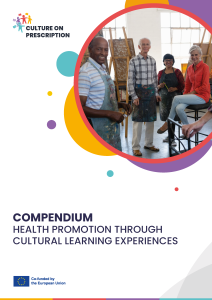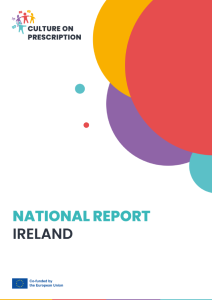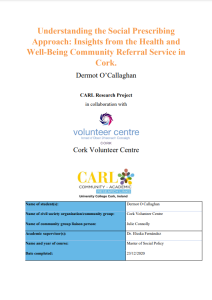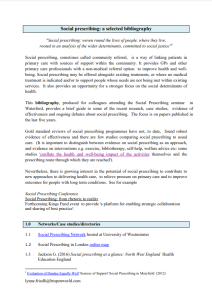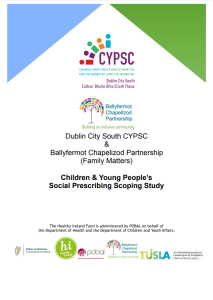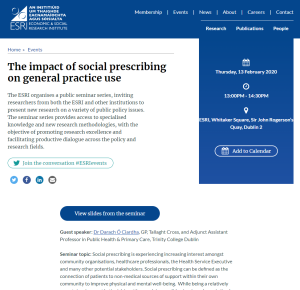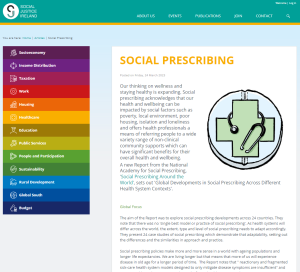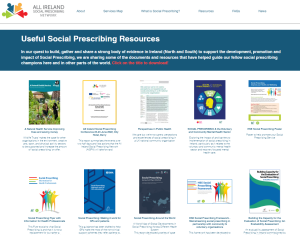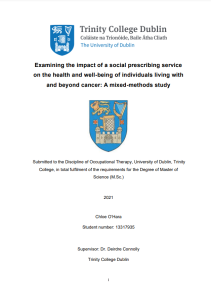DOCUMENTS
The Irish healthcare system is increasingly struggling to support population health and well-being. Recent Irish health policies are adopting a broader understanding of population health and well-being and an appreciation for the social dimension of health and wellbeing. Social Prescribing is a new approach to supporting population health and wellbeing based on this assumption. The social prescribing approach involves linking healthcare service users with non-clinical sources of support in their local communities through Civil Society Organisations (CSO). To date however, a lack of theorisation, national guidelines or general literature on the approach in the Irish context has existed. Hence, the aim of this study was “To explore understandings of the social prescribing approach in Ireland, amongst stakeholder groups involved in services using a social prescribing approach.
Social prescribing, sometimes called community referral, is a way of linking patients in primary care with sources of support within the community. It provides GPs and other primary care professionals with a non-medical referral option to improve health and wellbeing. Social prescribing may be offered alongside existing treatments, or where no medical treatment is indicated and/or to support people whose needs are not being met within existing services. It also provides an opportunity for a stronger focus on the social determinants of health. This bibliography, produced for colleagues attending the Social Prescribing seminar in Waterford, provides a brief guide to some of the recent research, case studies, evidence of effectiveness and ongoing debates about social prescribing. The focus is on papers published in the last five years.
This scoping study is undertaken for the ABC Family Programme in Ballyfermot Community Partnership to explore if and how a social prescribing (SP) pilot project for young people might yield positive outcomes within the community and voluntary sector, particularly youth services.
Social prescribing is experiencing increasing interest amongst community organisations, healthcare professionals, the Health Service Executive and many other potential stakeholders. Social prescribing can be defined as the connection of patients to non-medical sources of support within their own community to improve physical and mental well-being. While being a relatively recent development in the Irish setting, social prescribing has been in evolution in the UK for almost decades and has been identified as a strategic priority by the NHS. Social prescribing offers the possibility of leveraging Social Capital to improve health and well-being. Though social Prescribing is not new, very few robust studies have been conducted into its efficacy and this represents a challenge for stakeholders and researchers and practitioners. We will discuss the experience of our GP Practice, GPs at Tallaght Cross, where we have been implementing social prescribing since 2016. We have identified a 25% reduction in attendance amongst patients who have availed of Social prescribing over a 2-year period. We will describe the process as we have developed it within our practice and discuss the insights we have gained.
The aim of the Report was to explore social prescribing developments across 24 countries. They note that there was no ‘single best model or practice of social prescribing’. As health systems will differ across the world, the extent, type and level of social prescribing needs to adapt accordingly. They present 24 case studies of social prescribing which demonstrate that adaptability, setting out the differences and the similarities in approach and practice.
A body of resources collected by All Ireland Social Prescribing Network.
Background: Early diagnosis and improved access to treatments, has meant that survival from cancer has improved by 1% per year as reported by the National Cancer Registry of Ireland (NCRI) in 2013 (NCRI, 2013). There are currently over 150,000 cancer survivors in Ireland (DOH, 2017). Cancer survivors experience continuing symptoms such as pain, fatigue, anxiety, depression and cognitive difficulties following treatment (Shneerson et al., 2015). These symptoms can impact on survivors’ performance of daily activities or occupations, thus preventing them from engaging in activities of importance to them (Player, MacKenzie, Wills & Loh, 2014). Social prescribing is a community-based service that supports individuals with health needs and chronic conditions to access activities, services and supports in their community (Lester et al., 2007). Social prescribing may offer accessible, community-based support to individuals living with cancer and enable them to engage in a variety of activities, services and initiatives that may reduce the impact of their diagnosis on their health and well-being (Macmillan Social Prescribing Service, 2018).

